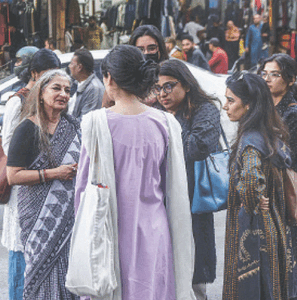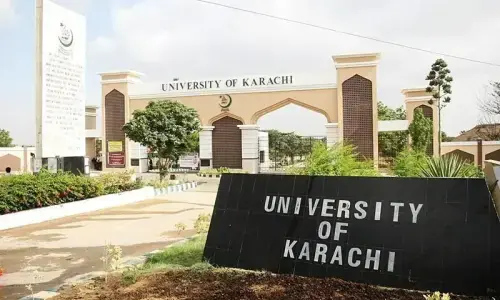KARACHI: It is a telling sign of the times when the winners of the highest literature award say they were not expecting to receive the award at least not in their lifetime. As Fahmida Riaz, winner of the Kamal-i-Fun lifetime achievement award by the Pakistan Academy of Letters, put it, such awards are marred by controversies, lobbies and favouritism. For Imdad Hussaini, who was conferred with the Dr Muhammad Iqbal Award for his Urdu poetry collection Dhoop Kiran, it was a pleasant surprise.
Both award winners were invited by the Anjuman Taraqqi-i-Urdu to celebrate their success at its office on Saturday.
Dr Asif Farrukhi spoke succinctly about their works. He said he first saw Ms Riaz at a function organised by the Idara Yadgar-i-Ghalib when his father Dr Aslam Farrukhi took him along. “I distinctly remember her reading her poetry and later puffing on a cigarette. My father’s friends were scandalised and told him that I would be messed up.”
He lauded her poetry and works in prose. “I think she is an outstanding short story writer. She has dealt with some heavyweight themes in her stories in a light-hearted manner. Very few writers are able to do this.” He also mentioned her translations which indicated her erudition. “Whether it is Ismail Kadare from Albania or Maulana Rumi, Fahmida is knowledgeable about world fiction and classical poetry.”
Mahnaz Rehman, who and Ms Riaz went to the same college in Hyderabad, said the younger sister of Ms Riaz, Najma, was her classmate and through her she got to know about her. “When her poetry collection Badan Dareeda was published, I was in college. For us, the college girls, her poetry was a revelation, it was astonishing that a woman could write on such a [taboo] subject. The book created an uproar,” said Ms Rehman, adding that Ms Riaz was upset about the kind of reaction the book garnered “but she is a brave woman and was undeterred”.
Prof Sahar Imdad Hussaini talked about Sindhi and Urdu poetry, translations of epic poems, radio and TV drama screenplays as some of her husband’s achievements. She said: “He began his literary journey in 1960 when his nazm was published in a literary magazine Afkar.”
She said his grandfather, Asadullah Shah Fida, was a scholar and poet of Urdu, Persian, Arabic and Sindhi. “He used to even take out a literary journal,” she added.
She also paid tribute to Ms Riaz and entertained the listeners with some amusing anecdotes.
In her characteristically pithy speech, Noorul Huda Shah said: “Women writers are full of thoughts but only half of them are articulated, while male writers do not have as many thoughts but all of them are articulated. Fahmida articulated all her ideas and thoughts, which is commendable.” She also said she couldn’t fathom out the reasons for the government to give awards to Ms Riaz and Mr Hussaini.
Unable to resist the disclosure of reasons, Fatema Hassan said some judges insisted that they be given the awards. “Dr Shah Mohammad Marri, an important name in Balochi poetry, was instrumental for Fahmida’s award and Prof Sahar Ansari for Imdad Hussaini’s award.”
Ms Riaz then read out an excerpt from the preface she had written for Dhoop Kiran. She said: “When Imdad Hussaini came to the limelight, Shaikh Ayaz was a powerful presence. Nevertheless, he created his own space with his innovative poetic sensibility and gained popularity among young readers. I also observed that Shaikh Ayaz’s poetry in Urdu and Sindhi are different whereas there is the same ambiance in Imdad’s Sindhi and Urdu poems.” She also read out some of his poems.
She said she was surprised to have received the award as many of her predecessors and contemporaries had been put into jails in the past. “Awards have no meaning for us, as they are marred by controversies and seek to serve certain agendas. But I am pleased to know that Sindhi and Baloch writers have given me this award. Maybe things are changing for the better.” She then read out some of her poetry.
Mr Hussaini dispelled the notion that he deliberately tried to carve a niche to be distinct from Shaikh Ayaz. “Everyone has their place. You can’t make someone significant by making others unimportant,” he said.
He also read out his new and old poems.
Prof Sahar Ansari and Zulqernain Jamil also spoke.
Published in Dawn, January 17th, 2016


































